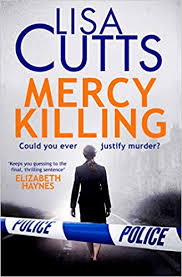The world is, alas, not straightforward – choices are hard, mistakes are made, doubts are cast and events in the past shape and often warp the future; all elements captured in Mercy Killing, by crime writer and real-life detective, Lisa Cutts. Centred around the murder of a known paedophile, Cutts deliberately muddies the waters throughout the novel, crafting a story that makes the reader’s reactions to characters less than straightforward, playing on our unease.
 What Cutts is exploring in the novel, a gritty, urban police procedural informed by her own experiences as an investigating detective, is the idea that bad things can come from good intentions, a concept which affects all the characters involved in the drama, and which sees each of them grappling with their own conflicts and making uncomfortable liaisons. At the head of the case, DI Powell is fully aware that, to solve the case, he must ‘break bread with a monster,’ and knows precisely the moment when he crosses the line. His personal dance with the devil involves a meeting with the less than wholesome Martha, who leads the Volunteer Army, a group of local people which at first seems to have a positive mandate – those involved are ‘trying to make it as safe for people as they can about living with sex offenders around them and we want to work with the police. We’re trying to do our bit to help.’ Yet urban vigilantes taking the law into their own hands is never a good idea, and later in the book the reason for the creation of the group is revealed, arising as it does from yet another evil beginning.
What Cutts is exploring in the novel, a gritty, urban police procedural informed by her own experiences as an investigating detective, is the idea that bad things can come from good intentions, a concept which affects all the characters involved in the drama, and which sees each of them grappling with their own conflicts and making uncomfortable liaisons. At the head of the case, DI Powell is fully aware that, to solve the case, he must ‘break bread with a monster,’ and knows precisely the moment when he crosses the line. His personal dance with the devil involves a meeting with the less than wholesome Martha, who leads the Volunteer Army, a group of local people which at first seems to have a positive mandate – those involved are ‘trying to make it as safe for people as they can about living with sex offenders around them and we want to work with the police. We’re trying to do our bit to help.’ Yet urban vigilantes taking the law into their own hands is never a good idea, and later in the book the reason for the creation of the group is revealed, arising as it does from yet another evil beginning.
DC Sophia Ireland’s own stance on pursuing criminals neatly outlines the whole moral dilemma of the book: ‘we can’t live in a society that thinks it’s ok to kill them off without so much as a trial.’ She has a firm grasp of the the crux of the book right there – the battle between justice and righteousness. But she in turn has an internal conflict: she is not convinced that DC Gabrielle Royston is suited to investigating the case, but does not want to betray a colleague – and Royston’s own situation is not clear-cut, either…

For all the grim issues the novel confronts, they are balanced by touches of humour throughout the story. One of the threads running through the plot is Powell’s slowly unravelling marriage – a situation arising, it becomes clear, again out of the best of intentions; in one scene, he returns late from work yet again, and undresses next to his wife in the hope that there might be an amorous encounter. ‘ ‘Don’t roll your bloody socks into a ball.’ Her words were accompanied by the sound of her turning over, and the click of the light switch…Sex was certainly off.’
From the outset, Cutts creates a series of characters, none of whom has a clear-cut status that is morally right or wrong. The reader is left unsure where to place their sympathies, and is thereby drawn into the depths of a web of moral ambiguity. Each suspect – and some of the police, too – has a stain on their character, which only becomes clear as the novel unfolds, but each has some element of their background, some aspect to their story, that means a straight and outright condemnation by the reader is not possible. It’s an effective device that pulls the reader onwards, leading them through what might be called an ‘immorality play,’ a darkly intricate tale where, as one of the characters observes early in the novel, even though the case may be solved and justice brought, there can be no winners.
Mercy Killing is the first in Cutts’ East Rise Incident Room series, published by Simon and Schuster in 2016
